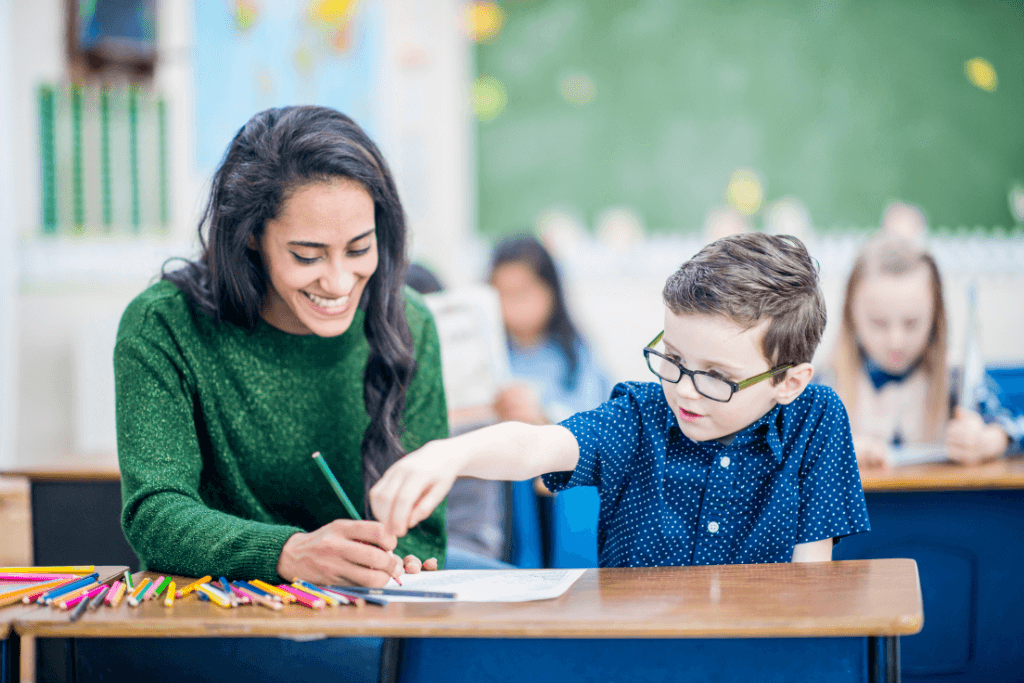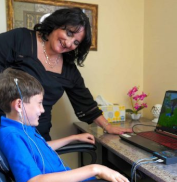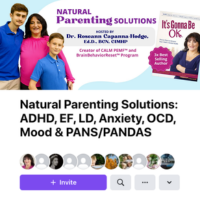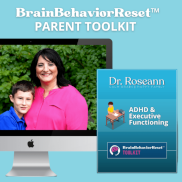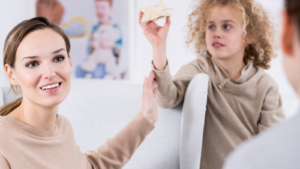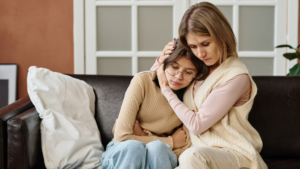Attention-Deficit Hyperactivity Disorder (ADHD) is a clinical disorder that affects 9.6 percent of the US population (CDC, 2021). Despite what most people think, ADHD isn't something kids “outgrow” and is a neurological condition that follows a person into adulthood.
ADHD looks different for each person, but for a clinical diagnosis, there must be difficulty with inattention, hyperactivity, and impulse control. ADHD appears in kids and teens as self-regulation difficulties that impact academic, learning, home, relationship, or social, behavioral, and emotional functioning.
People with ADHD, specifically children with ADHD, have a set of unique gifts and areas of challenge. The symptoms of ADHD in children and teens can vary widely.
For those diagnosed with ADHD, one person might be charming but struggle with motivation or work productivity. Another can have difficulty controlling impulses that affect his sibling and peer relationships but get his school work done. They both have ADHD, but how it impacts their daily functioning is vastly different.
Natural ADHD Treatments
There are treatments for children with ADHD that don't have side effects, and the good news is that these methods can create long-term changes in brain function. ADHD medication may be commonly used to treat ADHD, but parents need science-backed solutions or “non medication treatment for adhd child” that help kids do better in school and life without dangerous side effects.
EEG biofeedback and ADHD alternative treatment and is a technology that changes unfocused brain waves into a calm and alert brain state safely and naturally through reinforcement. In our BrainBehaviorReset™ program, we use this time-tested technology that feels much like video games for children but is changing the brain. It is pleasant, effective, and, most importantly, safe without the harmful side effects of ADHD medications.
One meta-analysis study showed that after neurofeedback, there was a high level of symptom reduction for inattention and impulsivity and a medium level of symptom reduction for hyperactivity (Arns, de Ridder, Strehl, Breteler & Coenen, 2009).
Parents also explore other natural remedies such as dietary changes, nutritional supplements, and herbal therapies. Omega-3 fatty acids, zinc, and magnesium are amoung the supplements commonly used due to their benefits. These ADHD alternative treatments can help the brain focus.
ADHD in the Real World
All kids with ADHD display problems with the alerting process of the brain, and kids can have difficulties with executive functioning. Planning and prioritizing for a future task or outcome isn't a skill those with ADHD are wired for, but executive functioning skills can be taught. You have to get them to think in a results-oriented manner.
As with any clinical disorder, ADHD has a significant negative impact in some way, shape, or form in a child's life. That negative impact affects the child or teen and their family, who has to act as project manager.
That ongoing project management is a source of friction that breaks down your relationship with your child.
Many parents ask about how to help their kids cope with ADHD without medication, and the research shows us there are many ways to help the brains of kids with ADHD become alert. Treating ADHD without medication can help reduce a child's symptoms and child's symptoms so they can be more independent and confident.
You must help your child's ADHD brain get alert and learn executive functioning skills. These non drug treatments for ADHD offer parents hope for healing the brain.
So, how exactly can a parent help their child or teen with ADHD celebrate their brain and still do well in school, get along with others, and complete tasks? Here are some of the best ways to do just that.
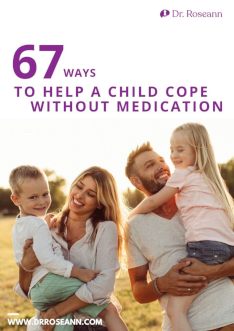
Download: 67 Ways to Help Your Child Cope without Medication
67 Best Ways to Improve Attention in Kids with ADHD
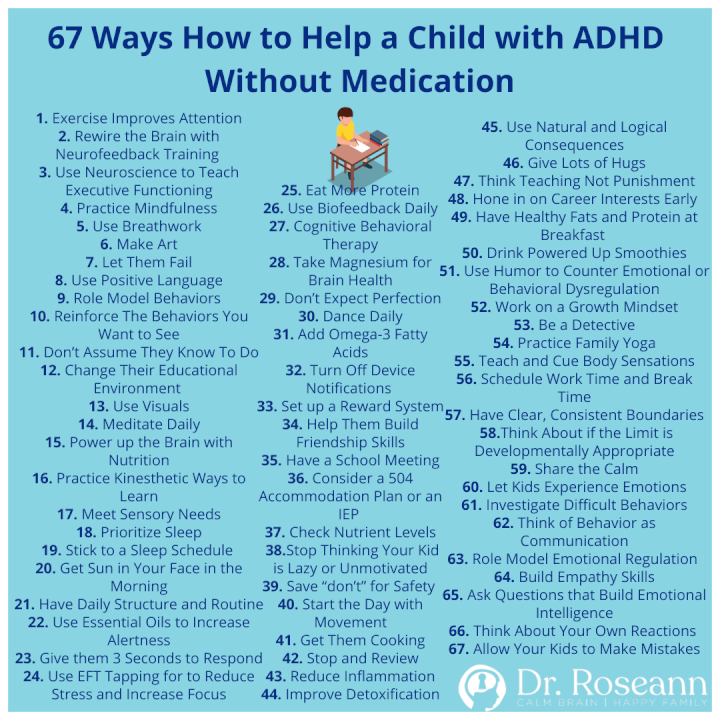
#1 Exercise Improves Attention
Research shows that exercising moderately three times a week for 30 minutes can improve symptoms related to ADHD by as much as 40%.
#2 Rewire the Brain with Neurofeedback Training
Thousands of research studies show us that neurofeedback is a safe and effective way to improve attention, behavior, and impulse control in children and adults.
#3 Use Neuroscience to Teach Executive Functioning
Show and talk about the result or outcomes. This step helps kids to “see” what they need to do because the ADHD brain has difficulty “seeing” outcomes.
#4 Practice Mindfulness
Teaching your kids to slow down and “smell the roses” helps build skills that can transfer to academic and daily tasks.
#5 Use Breathwork
Regular breath work not only calms the brain but improves alertness and concentration. It is easy, free, and can increase brain functioning with just a few minutes of practice a day.
#6 Make Art
The sensory experience of art provides brain stimulation that helps kids engage in daily activities.
#7 Let Them Fail
Autonomous parenting means that kids learn independence through problem-solving experiences. They build stress tolerance and coping skills only when they make small and big failures.
#8 Use Positive Language
Parenting a child who feels like the child is not listening can be challenging, so shifting language to the positive helps a child learn better and improves the parent-child relationship.
#9 Role Model Behaviors
Kids learn by watching you, not by listening to what you tell them. So, model behaviors you want your kids to exhibit.
#10 Reinforce The Behaviors You Want to See
Many kids with ADHD are only told what they shouldn't be doing when we should be reinforcing the behaviors we want to see more of.
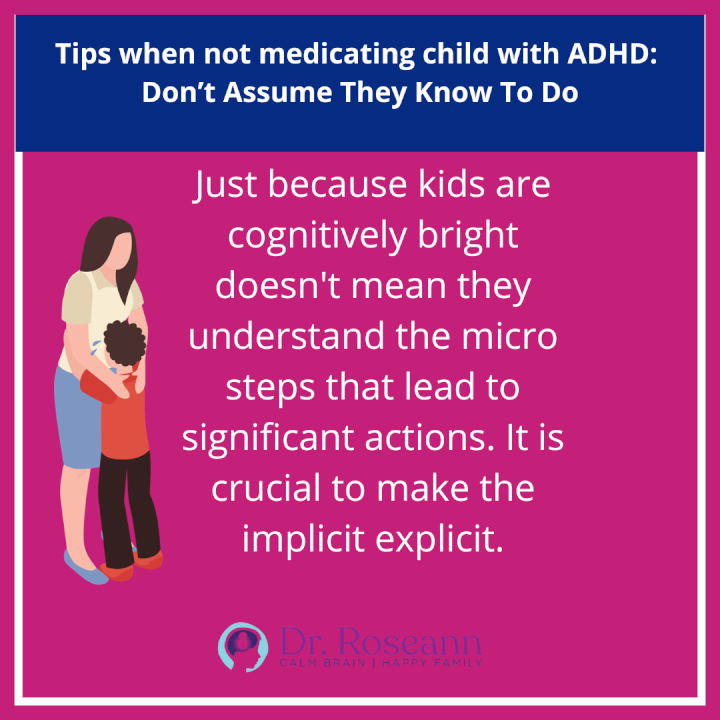
#11 Don't Assume They Know To Do
Just because kids are cognitively bright doesn't mean they understand the micro steps that lead to significant actions. It is crucial to make the implicit explicit.
#12 Change Their Educational Environment
Some kids' learning environment doesn't reflect their strengths and learning style. So a change might benefit them.
#13 Use Visuals
Kids with ADHD are almost exclusively visual and kinesthetic learners, so using visuals helps improve attention.
#14 Meditate Daily
Research shows that 40 days of meditating for ten or more minutes a day increases focused brain waves. That means your brain will be more alert in a calm and focused way.
#15 Power up the Brain with Nutrition
Eating nutrient-dense food and a blanched diet low in processed foods gives the brain what it needs to pay attention to and learn. We all can add in more foods that optimize our brain functioning.
#16 Practice Kinesthetic Ways to Learn
Gesturing and role-playing great ways to activate the ADHD brain's learning style.
#17 Meet Sensory Needs
Sensory activities provide the brain with stimulation to stay engaged for periods as long as 20 minutes.
#18 Prioritize Sleep
Getting enough quality sleep gives the brain time to repair and reorganize itself, improving focus and memory, increasing detoxification, and lowering inflammation.
#19 Stick to a Sleep Schedule
Going to bed and getting up within the same 30 minutes time frame helps improve sleep quality, which directly affects energy levels.
#20 Get Sun in Your Face in the Morning
With so much blue light exposure, we need to directly counter it with sunlight on our face, which improves our natural circadian rhythms and alertness.
#21 Have Daily Structure and Routine
When we have predictable structure and routine, it helps kids learn the daily tasks we all need to do at that innate level.
#22 Use Essential Oils to Increase Alertness
Essential oils such as peppermint and orange are an easy and natural way to stimulate the brain, increase alertness and improve mood.
#23 Give them 3 Seconds to Respond
Kids with ADHD often have poorly developed auditory systems. So, cueing them first and then waiting three seconds for them to know before you give them directions will not only cut down on repeating but also increase their listening and alleviate friction.
#24 Use EFT Tapping for to Reduce Stress and Increase Focus
Kids with ADHD often have high-stress levels and anxiety and need quick resources like EFT tapping to help reduce anxious thoughts and sensations.
#25 Eat More Protein
Consistent protein every three to four hours prevents blood sugar dips that can interfere with attention and mood.
#26 Use Biofeedback Daily
Biofeedback is inaccessible technology that helps to regulate the nervous system and has been shown to reduce stress, improve sleep, and increase focus.
#27 Cognitive Behavioral Therapy
Using CBT to address negative thinking and the shame most kids with ADHD feel can be pretty helpful in guiding them to new mental connections.
#28 Take Magnesium for Brain Health
Magnesium is the most used nutrient in the body and something most of us need more, so by replacing it, our brains and bodies work better.
#29 Don't Expect Perfection
Trying to fit the ADHD brain into a box stalls their creative juices and limits their potential.
#30 Dance Daily
Movement and music or both improve attention, energy levels, and mood. Movement not only improves mental health, it also reduces behavioral problems.
#31 Add Omega-3 Fatty Acids
Research shows that many with ADHD can benefit from directly supplementing fish oil to improve attention and focus.
#32 Turn Off Device Notifications
The constant interruption of notifications is a definite deterrent when trying to get work done, so turning it off gives the brain uninterrupted focus time.
#33 Set up a Reward System
Using an explicit reward system, where they earn device video game time for daily tasks, increases the likelihood that they will perform these tasks, and it will cut down on friction.
#34 Help Them Build Friendship Skills
Some kids with ADHD struggle with social skills, so it's essential to help them before all social interactions by having a conversation about expectations and how to manage that particular interaction successfully.
#35 Have a School Meeting
Develop a strong relationship with your child's teacher(s), proactively find out what your child needs, and put support into place. Teach them about your child's strengths and how they learn best.

Download: 67 Ways to Help Your Child Cope without Medication
#36 Consider a 504 Accommodation Plan or an IEP
Just because your child is bright doesn't mean they have all the skills they need to learn, and sometimes they might benefit from accommodations or direct support through an IEP.
#37 Check Nutrient Levels
Genetic mutations that interfere with nutrient absorption are common for those with ADHD. Getting lab work through a functional medicine practitioner can help set you on the right path.
#38 Stop Thinking Your Kid is Lazy or Unmotivated
Kids become unmotivated when they don't know where to start, so helping them not just with starting but seeing where they're going is what makes the difference.
#39 Save “don't” for Safety
When we are constantly pointing out what the child shouldn't do, they really don't learn what they should do, so saving the word “don't” for safety items only helps the brain to be more alert when it hears it.
#40 Start the Day with Movement
Exercise increases blood flow in the brain, which improves alertness and energy levels, so get them moving. Nature walks, dancing, trampolining and other activities are a great way to start the day.
#41 Get Them Cooking
Kids can learn independent thinking and problem-solving skills as well as build self-esteem through independent cooking. It is the perfect opportunity to make mistakes and learn from them, as well as for you to spend time with your kids.
#42 Stop and Review
Getting into a regular habit of stopping and reviewing where they're going, and the steps they have and need to make to achieve that goal is a good habit.
#43 Reduce Inflammation
Inflammation within the brain and body has been long shown to affect cognitive functioning, so reducing inflammation through diet and exercise helps to improve alertness.
#44 Improve Detoxification
Daily exposure to toxins and infectious diseases can lead to brain fog and slowed processing, so adding simple detoxification strategies into one's daily life can optimize brain function.
#45 Use Natural and Logical Consequences
In this world of helicopter parenting, kids lack problem-solving skills. Natural consequences help kids to build problem-solving and coping skills.
#46 Give Lots of Hugs
Kids with ADHD often feel criticized and defensive because of the amount of guidance they need. Hugging is a way to reconnect with your child and show them how much you love them.
#47 Think Teaching Not Punishment
Your child isn't acting this way on purpose! Punishment doesn't teach kids what they should be doing, so focus on teaching skills.
#48 Hone in on Career Interests Early
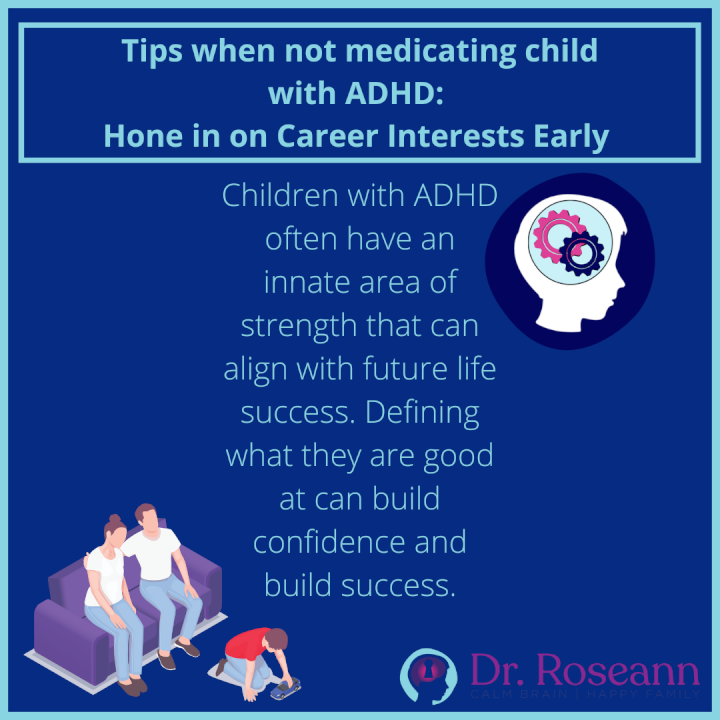
#49 Have Healthy Fats and Protein at Breakfast
Getting the right brain nutrients in the first meal can help the brain power up and function more optimally throughout the entire day.
#50 Drink Powered Up Smoothies
Smoothies are a great way to sneak in fruits, veggies, fats, and proteins that the brain needs. They are quick and easy to prepare, and kids can make them themselves.
#51 Use Humor to Counter Emotional or Behavioral Dysregulation
Humor is a great stress diffuser. When we parent with humor, we can bring more joy into life's little moments and reduce stress.
#52 Work on a Growth Mindset
In a world where 70% of all decisions are fear-based, teach your child that growth happens when you are uncomfortable.
#53 Be a Detective
When problem behaviors arise, look at antecedents and contributors before working on solutions.
#54 Practice Family Yoga
Yoga teaches a child to anchor the body and regulate their breath, and the whole family could benefit from that.
#55 Teach and Cue Body Sensations
Instead of avoiding uncomfortable body sensations, teach kids to connect to them so they can be more aware of a range of emotions, as well as stressors.
#56 Schedule Work Time and Break Time
If your child is struggling with sustained focus, try to schedule 20 minutes to focus and complete work. If your child feels like they can still sit and focus, have them keep going a little longer. If not, take 20 minutes to do some fun movement (outside if possible) and then return to another 20-minute work/task period.
#57 Have Clear, Consistent Boundaries
Even when kids push back, having consistent boundaries provides the reinforcement the kids need to learn. Moreover, clear boundaries give clarity and structure.
#58 Think About if the Limit is Developmentally Appropriate
Before setting a limit with a child, ask if this limit is developmentally appropriate? Does my child understand what they have to do? Do they need help problem-solving? You want to set your child up for success, not see them struggle because their task isn't developmentally appropriate.
#59 Share the Calm
Kids co-regulate off of us. That means if we are anxious, so are they. So working on calming our nervous system should be a priority.
#60 Let Kids Experience Emotions
Nobody likes being uncomfortable, but it is through uncomfortableness that kids learn how to tolerate emotions. That is why we need to let our kids experience a range of emotions so they can learn to self-regulate and cope.
#61 Investigate Difficult Behaviors
Behavior is the language of children of all ages, and when we see complex behaviors, we should identify the why behind those behaviors.
#62 Think of Behavior as Communication
Children aren't trying to be “manipulative”; they're trying to tell you what their thoughts and feelings are. Never assume they are doing something on purpose, and think about what your child is trying to communicate.
#63 Role Model Emotional Regulation
We can only help meet our children's emotional needs by supporting our own. If you are yelling and easily upset, that is the behavior your child will exhibit. Prioritize self-care and do brain calming activities with your child.
#64 Build Empathy Skills
For children to build empathy skills, they need to see it, practice it, and experience it. Empathy is one of the most important skills a child can have in all realms of life. Strong leaders rank high in empathy.
#65 Ask Questions that Build Emotional Intelligence
Ask questions such as, “how do you think they felt “, “What would you have done differently?, or “What could help you get through it?” You want your child to be a thinker, not a follower, and building EQ skills is just how you do that.
#66 Think About Your Own Reactions
When you overreact, think about your own triggers for the behavior and then work on your own stuff. Your children learn from you, so open conversations about how you problem-solve are invaluable.
#67 Allow Your Kids to Make Mistakes
Not only should you allow your kids to make mistakes but make them feel safe enough that they can do that. Never shame or blame them; instead, normalize making mistakes through your actions.

Download: 67 Ways to Help Your Child Cope without Medication
Understanding ADHD
The most common approach to treating ADHD involves medications, such as stimulants and non-stimulants, which can be effective in managing symptoms. However, many individuals seek alternative treatments for various reasons, including concerns about side effects, desire for a holistic approach, or personal preferences.
Children with ADHD often face unique challeneges in traditional settings, including difficulties with attention, impulse control and hyperactivity. School alteratives for ADHD or school supports may be needed. Parents may look for specialized programs or school, consider homeschooling, or get behavioral support.
Behavioral Therapies for Children with ADHD
Behavioral therapies offer valuable non-medication options for children with ADHD, addressing their specific needs and fostering essential skills for managing symptoms.
Here's an in-depth look at some effective behavioral therapies and strategies that are alternative treatments for ADD:
-
Behavior Modification: Behavior modification techniques involve systematically reinforcing positive behaviors and discouraging negative ones. This approach can help children with ADHD learn self-control, improve attention span, and reduce impulsive actions.
-
Cognitive-Behavioral Therapy (CBT): CBT is a structured and evidence-based therapy that focuses on identifying and changing problematic thought patterns and behaviors. In the context of ADHD, CBT helps children develop coping strategies, enhance executive functioning skills, and gain better impulse control. It also emphasizes self-awareness and self-regulation, which are crucial for managing ADHD effectively.
-
Parent Training: Parent training programs provide parents with valuable tools and strategies to support their children with ADHD. These programs teach parents how to set clear expectations, implement consistent routines, and use positive reinforcement effectively. Strengthening the parent-child relationship and improving communication are also key goals.
-
Social Skills Training: Many children with ADHD struggle with social interactions and impulse management. Social skills training helps them develop essential social and communication skills, such as active listening, problem-solving, and conflict resolution. These skills can lead to more successful relationships at home, in school, and with peers.
-
Token Systems: Token systems are a practical behavioral intervention that uses a token economy to reinforce positive behaviors. Children earn tokens for completing tasks or demonstrating appropriate behavior, which can later be exchanged for rewards or privileges. This approach can motivate children with ADHD to stay on track and follow routines.
-
Executive Functioning Skills Training: Executive functioning skills, including organization, time management, and planning, are often underdeveloped in children with ADHD. Behavioral therapies can target these skills, helping children become more independent and efficient in their daily activities and schoolwork.
-
Anger Management: Some children with ADHD may struggle with anger and emotional regulation. Behavioral therapies can include anger management techniques to help children recognize and control their emotions in constructive ways.
-
Individualized Plans: Each child with ADHD is unique, and behavioral therapy plans should be tailored to their specific needs and challenges. Personalized strategies can address areas of weakness while capitalizing on the child's strengths.
By incorporating these behavioral therapies into your child's ADHD management plan, you can create a holistic approach that complements other treatments and medications when necessary. These therapies focus on building essential life skills, improving self-esteem, and fostering self-control, ultimately enhancing the overall well-being of children with ADHD.
What is Next?
When thinking about how to treat ADHD without meds, you have to pick a natural solution for Attention Deficit Hyperactivity Disorder and stick with it for at least 30 days. Whether it is a ADHD to alternative for for medication or some other alernative ADHD treatment options for younger children or a teen, every brain is capabale of change.
Treating adhd without medication is possible and I hope every parent is empowered to start using one of these 67 methods today!
Citations:
Arns, M., de Ridder, S., Strehl, U., Breteler, M., & Coenen, A. (2009). Efficacy of neurofeedback treatment in ADHD: The effects on inattention, impulsivity and hyperactivity: A meta-analysis. Clinical EEG and Neuroscience, 40(3), 180-189. DOI: 10.1177/155005940904000311
CDC ADHD fact sheet retrieved on March 16, 2022 https://www.cdc.gov/ncbddd/adhd/data.html
Dr. Roseann is an ADHD Expert and frequently featured in the media:
- Healthline Understanding Self-Regulation Skills
- Parents Are Your Kid's Meltdowns a Sign of Rejection Sensitive Dysphoria?
- Medium How to Minimze Distraction During the Holidays
- She Knows 11 Products Moms of Kids With ADHD Swear By to Maintain Order in the Chaos
- The Healthy 12 Silent Signs of Adult ADHD You Might Be Ignoring
Always remember… “Calm Brain, Happy Family™”
Are you looking for SOLUTIONS for your struggling child or teen?
Dr. Roseann and her team are all about solutions, so you are in the right place!
There are 3 ways to work with Dr. Roseann:
You can get her books for parents and professionals, including: It’s Gonna Be OK™: Proven Ways to Improve Your Child’s Mental Health, Teletherapy Toolkit™ and Brain Under Attack: A Resource For Parents and Caregivers of Children With PANS, PANDAS, and Autoimmune Encephalopathy.
If you are a business or organization that needs proactive guidance to support employee mental health or an organization looking for a brand representative, check out Dr. Roseann’s media page and professional speaking page to see how we can work together.
Dr. Roseann is a Children’s Mental Health Expert and Licensed Therapist who has been featured in/on hundreds of media outlets including The Mel Robbins Show, CBS, NBC, PIX11 NYC, Today, FORBES, CNN, The New York Times, The Washington Post, Business Insider, Women’s Day, Healthline, CNET, Parade Magazine and PARENTS. FORBES called her, “A thought leader in children’s mental health.”

She coined the terms, “Re-entry panic syndrome” and “eco-anxiety” and is a frequent contributor to media on mental health.
Dr. Roseann Capanna-Hodge has three decades of experience in working with children, teens and their families with attention-deficit hyperactivity disorder (ADHD), autism, concussion, dyslexia and learning disability, anxiety, Obsessive Compulsive Disorder (OCD), depression and mood disorder, Lyme Disease, and PANS/PANDAS using science-backed natural mental health solutions such as supplements, magnesium, nutrition, QEEG Brain maps, neurofeedback, PEMF, psychotherapy and other non-medication approaches.
She is the author of three bestselling books, It’s Gonna Be OK!: Proven Ways to Improve Your Child's Mental Health, The Teletherapy Toolkit, and Brain Under Attack. Dr. Roseann is known for offering a message of hope through science-endorsed methods that promote a calm brain.
Her trademarked BrainBehaviorResetⓇ Program and It’s Gonna be OK!Ⓡ Podcast has been a cornerstone for thousands of parents facing mental health, behavioral or neurodevelopmental challenges.
She is the founder and director of The Global Institute of Children’s Mental Health, Neurotastic™Brain Formulas and Dr. Roseann Capanna-Hodge, LLC. Dr. Roseann is a Board Certified Neurofeedback (BCN) Practitioner, a Board Member of the Northeast Region Biofeedback Society (NRBS), Certified Integrative Mental Health Professional (CIMHP) and an Amen Clinic Certified Brain Health Coach. She is also a member of The International Lyme Disease and Associated Disease Society (ILADS), The American Psychological Association (APA), Anxiety and Depression Association of America (ADAA) National Association of School Psychologists (NASP), International OCD Foundation (IOCDF).
© Roseann-Capanna-Hodge, LLC 2023
Disclaimer: This article is not intended to give health advice and it is recommended to consult with a physician before beginning any new wellness regime. *The effectiveness of diagnosis and treatment vary by patient and condition. Dr. Roseann Capanna-Hodge, LLC does not guarantee certain results.

